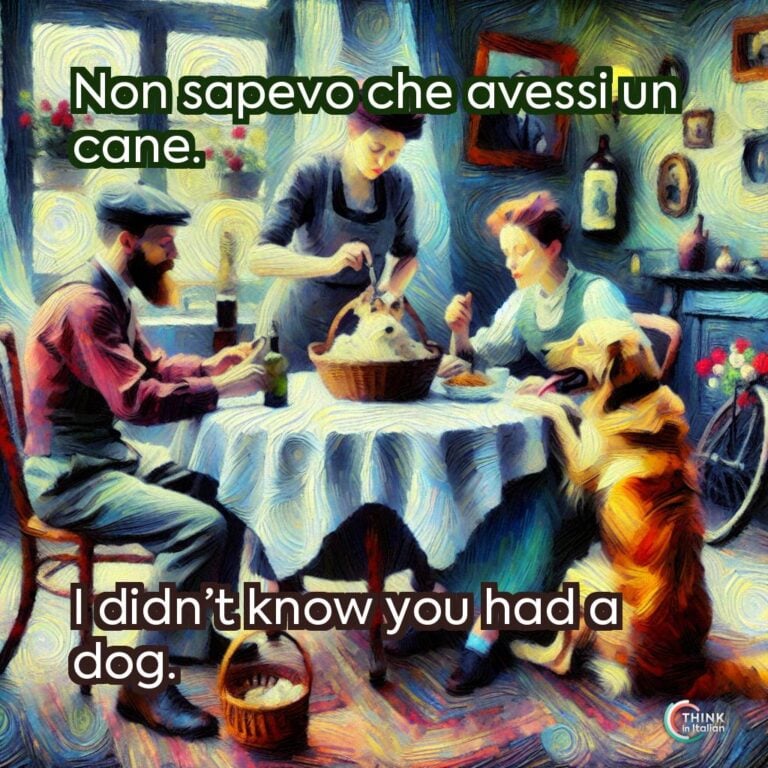Non Sapevo che + Subjunctive
In Italian, the phrase non sapevo che (I didn’t know that) is typically followed by the subjunctive mood as it expresses surprise, uncertainty, or doubts.
Grammatically, non sapevo is composed of the verb sapere (to know) conjugated in the imperfetto (imperfect tense), providing a sense of past continuity and indicating that the state of “not knowing” lasted over a period of time.
This choice of this verb tense is essential here, as it implies that the speaker’s lack of knowledge was ongoing in the past until the moment of discovery.
In Italian, there are two verbs that relate to knowledge or awareness but carry distinct meanings based on context and tense: sapere and conoscere.
Sapere generally means “to know” a fact, skill, or piece of information. In the imperfect tense it conveys continuous or ongoing state, or, in this case, the continuous lack of it.
Non sapevo che tu fossi qui.
I didn’t know that you were here.
Conoscere means “to be familiar with” or “to meet”. In the imperfect tense it conveys familiarity or acquaintance over time.
Conoscevo già quella città.
I was already familiar with that city.
In the present perfect, these verbs take on different meanings: sapere indicates a specific moment of realization or discovery, while conoscere refers to meeting someone for the first time.
In this structure, the imperfect and negative form non sapevo suggests a continuous state of ignorance, rather than a single, completed moment of realization.
When paired with either the imperfect subjunctive or the past perfect subjunctive, it brings in elements of surprise, disbelief, or learning something new.
How to use “Non Sapevo che + Subjunctive” in Italian
Expressing Surprise or New Information
One of the most common uses of non sapevo che + subjunctive is to express surprise upon learning new or unexpected information, like when you find out something that challenges your previous assumptions.
Non sapevo che tu fossi vegetariano.
I didn’t know that you were a vegetarian.
Here, fossi is the imperfect subjunctive of essere (to be). It emphasizes that the speaker is learning new information about the person.
Conveying Uncertainty or Doubt
Non sapevo che can also add a layer of uncertainty or doubt about information that the speaker only recently became aware of. It reflects that the speaker’s understanding regarding facts was incomplete.
Non sapevo che loro avessero già deciso.
I didn’t know that they had already decided.
In this sentence, avessero deciso is the past perfect subjunctive of decidere (to decide). It adds a sense of surprise regarding the decision, which was unknown to the speaker until now.
Congiuntivo Imperfetto vs Trapassato
“Non Sapevo che” + Imperfect Subjunctive
The imperfect subjunctive is used after non sapevo che when referring to an action or state that was ongoing or habitual in the past, or when the unknown fact being described coincided with the “not knowing” of the speaker.
Non sapevo che tu fossi Spagnolo.
I didn’t know that you were Spanish.
Non sapevo che lui parlasse cinese.
I didn’t know that he spoke Chinese.
“Non Sapevo che” + Past Perfect Subjunctive
The past perfect subjunctive is used to express a completed action or state that occurred before the moment of “not knowing”.
It is useful for situations where the fact being described had already happened or was already completed before the speaker became aware of it, adding a sense of past-in-the-past.
Non sapevo che loro fossero partiti prima.
I didn’t know that they had left before.
Non sapevo che lui avesse comprato una casa.
I didn’t know that he had bought a house.
“Non Sapevo” + Other Relative Pronouns
Non Sapevo chi
When the relative pronoun chi (who) follows non sapevo, it introduces an element of uncertainty or a lack of knowledge about a person. The choice of the tense depends on the same aspects I described before.
Non sapevo chi fosse il responsabile.
I didn’t know who the person in charge was.
Non sapevo chi avesse spento la luce.
I didn’t know who had switched off the light.
Non Sapevo Dove
When dove (where) is use as a relative pronoun in Italian and follows non sapevo, it indicates a lack of knowledge regarding location.
Non sapevo dove si trovasse il museo.
I didn’t know where the museum was.
Non sapevo dove avessi messo le mie chiavi.
I didn’t know where you put my keys.
Non Sapevo Perché
When perché (why) is used after non sapevo, it indicates a lack of knowledge about the reason or cause of something.
Non sapevo perché dicesse quelle cose.
I didn’t know why he said those things. / I didn’t know why he was saying those things.
Non sapevo perché se ne fosse andato.
I didn’t know why he had left.
Non Sapevo Cosa
Using cosa (what) introduces unknown details about an object, action, or situation.
Non sapevo cosa volesse dire.
I didn’t know what he meant.
Non sapevo cosa avesse fatto quel giorno.
I didn’t know what he had done that day,




